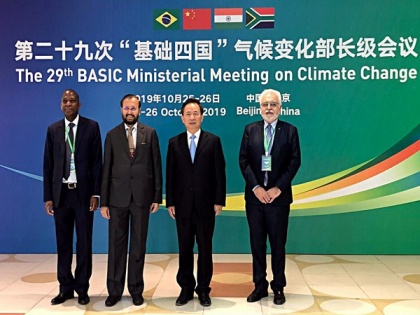Protectionism will end up damaging global efforts against climate change, say BASIC member countries
By ANI | Published: October 26, 2019 11:18 PM2019-10-26T23:18:02+5:302019-10-26T23:30:07+5:30
Ministers taking part in the meeting of BASIC countries on Climate Change have said that unilateralism and protectionism undermine the open international trade system and prospects of global economic growth which will end up damaging global efforts against climate change.

Protectionism will end up damaging global efforts against climate change, say BASIC member countries
Ministers taking part in the meeting of BASIC countries on Climate Change have said that unilateralism and protectionism undermine the open international trade system and prospects of global economic growth which will end up damaging global efforts against climate change.
In a joint statement issued at the conclusion of 29th BASIC (Brazil, South Africa, India, China) Ministerial Meet on Climate Change, they said it is imperative to focus on safeguarding the multilateral process and fulfilment of commitments. Union Minister for Environment, Forest and Climate Change, Prakash Javadekar, participated in the two-day meeting that concluded on Saturday.
BASIC ministers expressed their concerns on the global challenge of climate change and its adverse effects, and confirmed their commitments to multilateralism in order to address the issue and to foster climate resilience and promote greenhouse gas emissions reduction, low-carbon and sustainable development.
The ministers underscored that all parties should jointly defend the international system underpinned by the United Nations, in accordance with the principles of equity, common but differentiated responsibilities and respective capabilities (CBDR-RC), in the light of different national circumstances.
The ministers emphasised comprehensive implementation of the Paris Agreement and underlined the importance of a full, effective and sustained implementation of the United Nations Framework Convention on Climate Change (UNFCCC), its Kyoto Protocol and its Paris Agreement.
They emphasised that global climate action should promote climate justice by recognising the fundamental equality of all people in accessing economic growth and sustainable development.
The BASIC ministers emphasised the need for people's participation and climate-friendly lifestyles for addressing the challenge of climate change acknowledging that Paris Agreement embodies and calls for sustainable lifestyles and consumption patterns.
They highlighted that developing countries, including BASIC countries, notwithstanding the multiple challenges including food security, poverty eradication, and insufficient and uneven progress of domestic development, have been implementing ambitious climate action based on their national circumstances in the context of sustainable development, and have achieved great progress with significant contribution to global efforts in combating climate change.
In 2018, China has reduced carbon dioxide emissions per unit of GDP by 45.8 per cent from the 2005 level, increased the share of non-fossil fuels in primary energy consumption to 14.3 per cent.
South Africa has recently implemented carbon tax and announced massive renewable energy programme in its latest electricity plan.
India has already achieved 21 per cent reduction in emission intensity of GDP in 2014 compared to 2005 levels and achieved its pre-2020 voluntary target.
In 2015, Brazil had already achieved a 58 per cent emission reduction in the business as usual scenario, "thereby overachieving its target of 36 per cent to 39 per cent reductions set for 2020".
The ministers valued 187 ratifications of the Paris Agreement to date, called on all remaining Parties to ratify, and welcomed the implementation of the Agreement in the post-2020 period. They urged the Parties that have not yet ratified the Doha Amendment to do so as soon as possible, striving for its prompt entry into force before COP25.
The group highlighted the substantial gaps not only in mitigation, but also in adaptation and support provided by developed countries to developing countries in the pre-2020 period.
They stressed that these gaps should not be transferred to the post-2020 period to present additional burdens on developing countries. They urged developed countries to take urgent actions to close the gaps, including revisiting their targets on mitigation under the Convention and the Kyoto Protocol, and fulfilling their commitments of providing support to developing countries.
The ministers underscored that as developing countries are the most adversely affected by climate change, adaptation is a key imperative but is neglected with imbalanced allocation of resources compared to mitigation.
They said that balanced allocation should be made for adaptation and mitigation in terms of support provided by developed countries, including through Green Climate Fund (GCF).
The group encouraged other fora, including the Global Commission on Adaptation to play their part in supporting developing countries on adaptation.
The ministers expressed their deep concern on the insufficiency and inadequacy of the support provided by developed countries to date, and underlined that the climate finance should be new, additional, and with significant public funded component.
They urged developed countries to fulfill their climate finance commitments of providing USD 100 billion annually by 2020 for developing countries in a transparent and grant-based manner.
The ministers urged developed countries to propose the new collective quantified goal on finance as soon as possible, including detailed roadmap and timetable. The goal should be from a floor of USD 100 billion per year, significantly publicly funded and of greater transparency.
The ministers welcomed India's offer to host the 30th BASIC ministerial meeting.
( With inputs from ANI )
Open in app